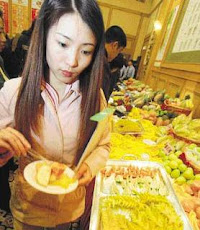CHIN Choon Sin, 70, who had severe diabetic sore feet, is thankful someone introduced him to eco-enzyme, which is also known as garbage enzyme.
“I was so helpless at that time as my feet has become dark with infections. Even the doctor had given up but I knew I had to try something to save my feet,” he said.
Chin is able to walk today as his wounds have dried up and the energetic elder was seen promoting the use of eco-enzyme during a talk held in conjunction with the Drainage Cleanliness Campaign held at the Dewan Rakyat Pasar Pagi, Tanjung Bungah, Penang yesterday.
The campaign was organised by the Pe- nang Sudarshan Kriya Organisation and Tanjung Bungah assemblyman Teh Yee Cheu.
 Eco-friendly enzyme:Pouring eco-enzyme into drians can help save the environment as it neutralises the chemicals inside them
Eco-friendly enzyme:Pouring eco-enzyme into drians can help save the environment as it neutralises the chemicals inside themConvinced user:Chin showing the wound on his leg that has healed with the help of eco-enzyme.
 Cheap and practical:Dr Oon demonstrating how eco-enzyme can be used to clean vegetables.
Cheap and practical:Dr Oon demonstrating how eco-enzyme can be used to clean vegetables.“I was like them, very doubtful at first and wondered how could some stinky muddy water save me but after three weeks of dipping my feet in it, my wounds started to heal!” he exclaimed excitedly.
Chief Minister Lim Guan Eng, who attended the campaign, said he first heard of the use of enzyme during the state assembly when Teh talked about recycling and promoting a green environment in the state.
“I didn’t really know what it was but I’m very interested with it. Now that I have a better idea of it and I hope more people will become aware of its benefit and start making it on their own at home,” he said.
He also said the state government in its first budget would implement several environmental measures to transform Penang into a green state.
Lim has also given the organisation permission to enter Pulau Burung to carry out cleanliness activity by pouring the eco-enzyme into rivers there.
Eco-enzyme is made from the fermentation for three weeks of leftover vegetables and fruit wastes. One has to mix one part of brown sugar with 10 parts of water, depending on the size of container used.
It can be added into shampoo, dish wash, laundry detergent as well as mixed with water for gardening and farming.
Eco-enzyme advocate Dr Joean Oon said: “The enzyme will neutralise the chemicals in our drainage systems and save the environment.
“We can reduce kitchen waste and that means less waste will be sent to the landfill.”
Lim later poured bottles of eco-enzyme into the drains at the market and distributed some bottles to hawkers there.
Those who attended the event were each presented with a bottle, a free container and brown sugar. They were also taught how to create their own eco-enzyme at home.
For details, contact 04-8901279.



